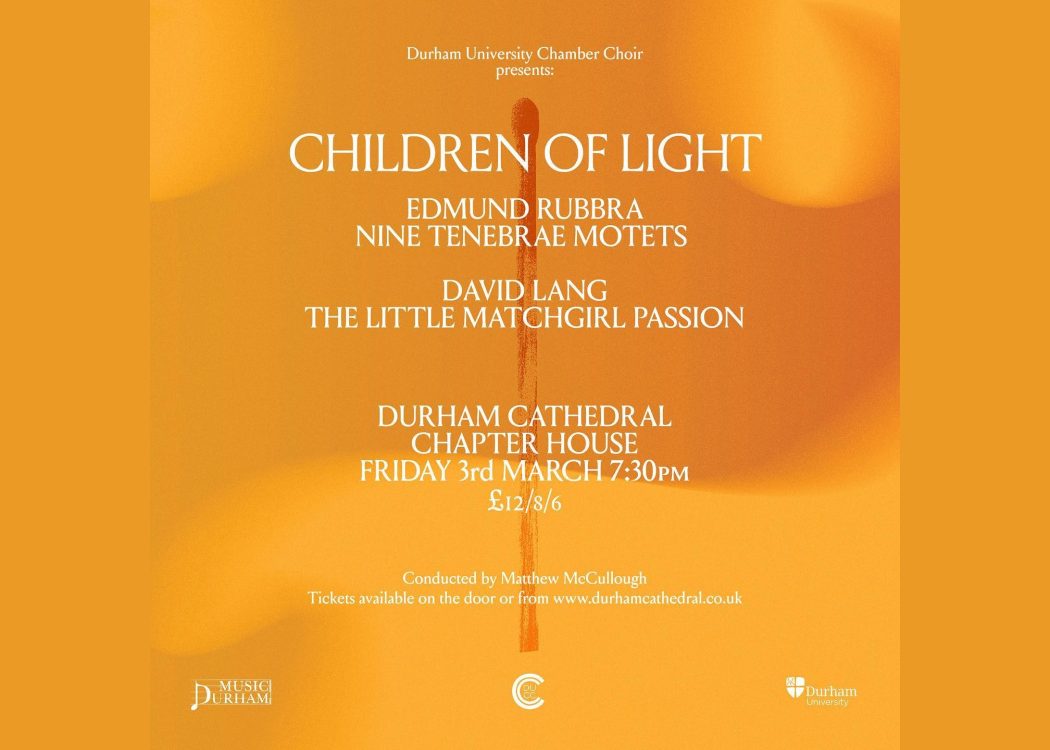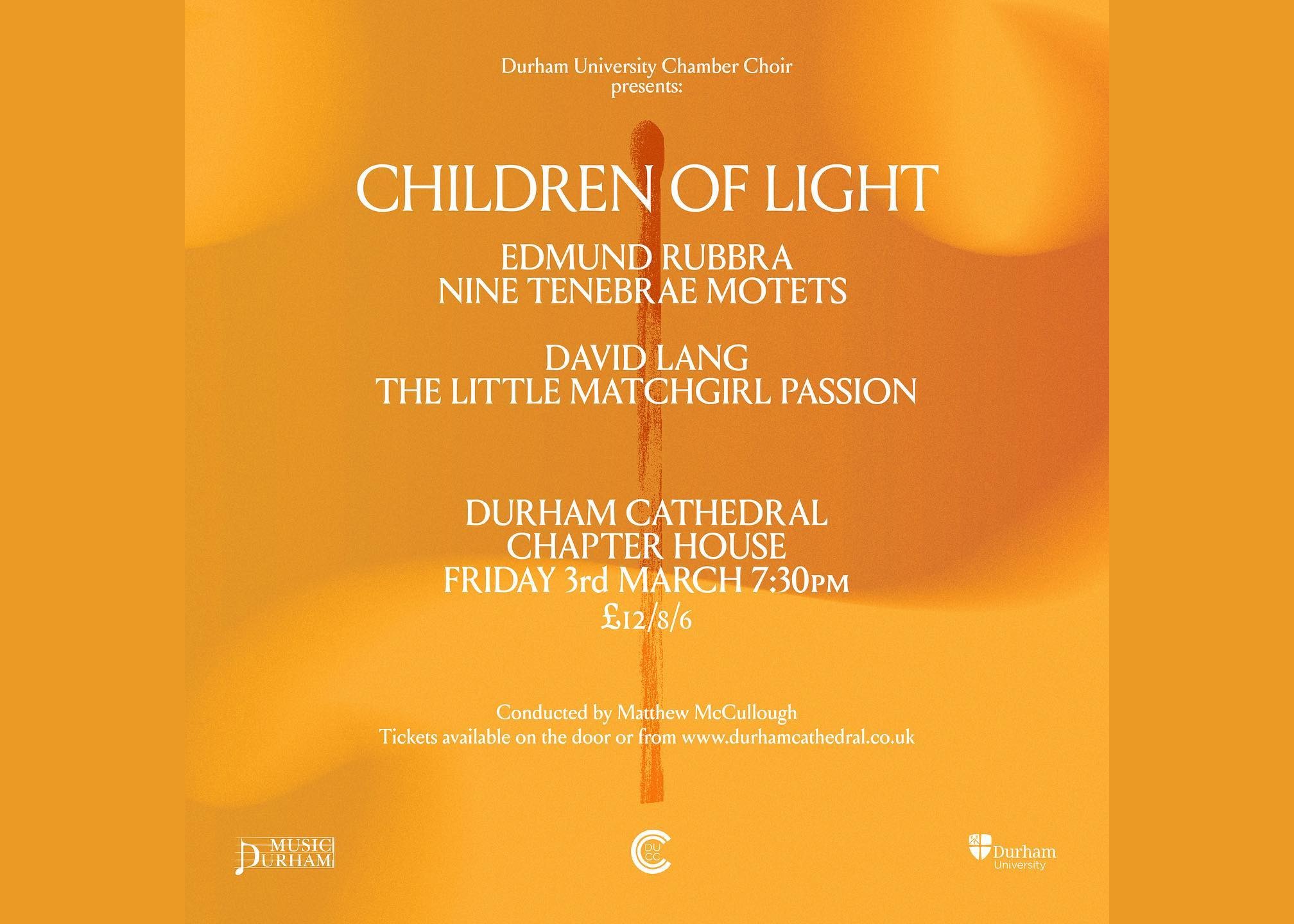In The Lord of the Rings, Tolkien’s hero Frodo is given a crystal phial with the words ‘May it be a light to you in dark places, when all other lights go out’. These lines kept returning to me during Durham University Chamber Choir’s Lent concert last night, with music that shone lights in the darkest places of the soul.
The service of Tenebrae marks Christ’s last lonely night on earth, when he is betrayed by Judas and his friends cannot stay awake to keep vigil with him. It’s a dramatic service in which candles and lights are gradually extinguished, leaving everyone in darkness and it ends with the crash of a book being slammed shut. The responsory texts are uncompromisingly stark and often in the first person, taking us up close to the story, and they have inspired composers from the middle ages onwards.
Edmund Rubbra’s ‘Nine Tenebrae Motets’ bring together three sets of these responses, and although composed over a period of ten years from 1951 to 1961 they sit together as a complete set, building to a thunderous ending for that book slamming that exploded through the Chapter House at the end of Durham University Chamber Choir’s stunning performance last night. DUCC, directed by Matthew McCullough are sounding particularly good this year – their flawless singing and beautiful shaping of Rubbra’s lines had me absolutely transfixed. Rubbra is one of those composers who deftly combines ancient and modern: parts of the motets feel underpinned by plainsong but then overlaid with startling harmonies. It’s music that demands close listening and I was impressed by how I was able to hear so much detail from the choir, even in the Chapter House’s big acoustic.
McCullough and his singers drew us in to the bleak introspection of the motets, leading us through the midnight garden at Christ’s side with careful attention to all the subtleties of Rubbra’s textual colouring. A kiss is beautiful but bitter. We feel the flight of the scared disciples and the approaching footsteps of the betrayer and above all the quiet sorrow of the lamb being led to slaughter. At times it was chilling, the hairs on the back of my neck rose, but there was warmth too, most poignantly at the end of the phrase ‘he was cut out of the land of the living’, where the music recalled the life that was to be lost.
A different tale of light in the darkness followed the interval with David Lang’s The Little Matchgirl Passion. Lang’s text takes Hans Christian Anderson’s sad story and merges it with texts from Bach’s St Matthew Passion retold in Lang’s own words (I will confess that I did get a bit distracted by this as I rummaged through my memory to identify which bit of the Bach each section was based on, especially as Lang’s writing is quite repetitive and didn’t demand my ear quite as much as the Rubbra). The narrative role of the Evangelist is taken by the full chorus, beginning with chanted fragments and building up layers of overlapping text as the piece develops: I was grateful for programme texts here because the acoustic just got too much even for the precision of McCullough’s singers. Of the Bach-inspired movements, the beautiful shaping of the line and falling off of phrases in ‘Penance and remorse’ was a highlight, as was the hypnotic ‘Have mercy, my God’ and the fearless cry of the soprano soloist on Eli, Eli.
The opening and closing choruses, and ‘When it is time for me to go’ were marked by stuttering percussive phrases, suggesting the little girl’s shivering and the soloists who took these lines were all excellent. There was real percussion too, played by members of the choir – a glockenspiel colouring the recitative, a sinister bass drum during the opening ‘Come daughter’ and bells shimmering through ‘We sit and cry’ at the end. And as this last movement faded away with the repeated phrase ‘rest soft’ the cathedral bells chiming nine o’clock punctuated the long pauses and Matthew McCullough timed his conducting around them. This was either incredibly lucky or the result of some extremely clever planning. I don’t actually want to know which, as I think that would break the magic of the moment.
DUCC have been consistently excellent over the years, and their alumni pop up all over the place in the UK’s professional choirs but somehow this year’s cohort have gone one step further and I was totally gripped from the very first notes of the concert. McCullough bookended the two main pieces with short pieces on the theme of love by two young contemporary composers, with the idea of the love that is still there even when the flame is extinguished. William Drakett’s setting of George Herbert’s ‘Love bade me welcome’ providing a glowing opening to the concert. At the end of the evening Alfred Noye’s poem ‘Let my love be heard’, set by Jake Runstead, reminded me of the radiant chorale that closes Bach’s St John Passion, which has a similar theme of angels taking a soul up to heaven, and which offered us a kindly light to lead us back out of the darkness.







